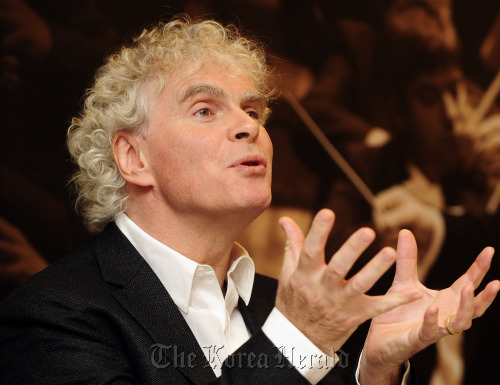Simon Rattle anticipates intensity, depth in audiences during Berlin Phil’s Seoul performance
While preparing two very different symphonies by two very dissimilar composers, maestro Simon Rattle hoped to tell just one story; a story in which the audience and the orchestra become one and feel the same air.
“On stage, you feel the atmosphere immediately. It is not the matter of sound, but the matter of the intensity of the audience,” Rattle, the star conductor of Berlin Philharmonic Orchestra, said at a press gathering in Seoul, Tuesday.
“We feel how they (the audience) breathe and what they notice,” he said. “Then we become one, telling one story together. In Korea, the depth of response was always immediately caught.”
The BPO, one of the world’s leading orchestras, will perform twice in Seoul with symphonies by late 19th century composers Gustav Mahler and Anton Bruckner.
While preparing two very different symphonies by two very dissimilar composers, maestro Simon Rattle hoped to tell just one story; a story in which the audience and the orchestra become one and feel the same air.
“On stage, you feel the atmosphere immediately. It is not the matter of sound, but the matter of the intensity of the audience,” Rattle, the star conductor of Berlin Philharmonic Orchestra, said at a press gathering in Seoul, Tuesday.
“We feel how they (the audience) breathe and what they notice,” he said. “Then we become one, telling one story together. In Korea, the depth of response was always immediately caught.”
The BPO, one of the world’s leading orchestras, will perform twice in Seoul with symphonies by late 19th century composers Gustav Mahler and Anton Bruckner.

The Nov. 15 concert at the Seoul Arts Center’s Concert Hall will feature Mahler’s Symphony No. 9, while the Nov. 16 performance at the Sejong Center for the Performing Arts will stage Bruckner Symphony No. 9.
The composers, the two of the most significant figures in the history of symphony after Beethoven, closely interacted with each other in music. The two pieces are the renowned composers’ last works, as Mahler never got to finish Symphony No. 10 and Bruckner spent 10 years composing up to the third movement of his Symphony No. 9 before passing away.
“These two composers, who were not so many years from each other, were emotionally moving in two different directions,” said Rattle. “But both music come from the center of the earth and talk about the beginning of things.”
Alongside Mahler and Bruckner, the BPO has also prepared Toshio Hosokawa’s horn concerto “Moment of Blossoming” and Ravel’s “Alborada del Gracioso” to “liven up the atmosphere,” Rattle said. Stefan Dohr will perform on the horn for the Hosokawa piece.
Since its first performance in 1984, the BPO has returned to Korea three times ― in 2005, 2008 and this year. Following the 2005 concert, during which Rattle promised Korean classical music devotees that he would return every three years, the orchestra performed a complete cycle of Brahms Symphonies in November 2008. And he has kept that promise, returning three years later.
“Korea is a country that gives an astonishing number of musicians to the world and welcomes as many with intensity and affection,” Rattle said, adding he hopes to perform a piece by Korean composer Jin Eun-sook in Korea in the future.
As it did in 2008, the BPO will open its rehearsals to an audience of 400 students before going on stage. Rattle and his team said that giving these young people a chance to hear their performance was one of the orchestra’s most important goals.
“Music is for everyone. I’ve always felt people need music as they need air and water,” said Rattle. “And we need to give everybody the opportunity to hear the orchestra because it can actually change their lives.”
Comparing the orchestra to a “body” and the music to “clothes,” Rattle said he will continue the mission “to create a discrete sound” while fitting in different composers during different concerts.
“The idea is the change ― change the clothes without affecting the body,” he said. “The role of a conductor is to gradually change and adapt.”
By Shin Hae-in (hayney@heraldcorp.com)


![[Exclusive] Korean military set to ban iPhones over 'security' concerns](http://res.heraldm.com/phpwas/restmb_idxmake.php?idx=644&simg=/content/image/2024/04/23/20240423050599_0.jpg&u=20240423183955)




![[Pressure points] Leggings in public: Fashion statement or social faux pas?](http://res.heraldm.com/phpwas/restmb_idxmake.php?idx=644&simg=/content/image/2024/04/23/20240423050669_0.jpg&u=)

![[Herald Interview] 'Amid aging population, Korea to invite more young professionals from overseas'](http://res.heraldm.com/phpwas/restmb_idxmake.php?idx=644&simg=/content/image/2024/04/24/20240424050844_0.jpg&u=20240424200058)








